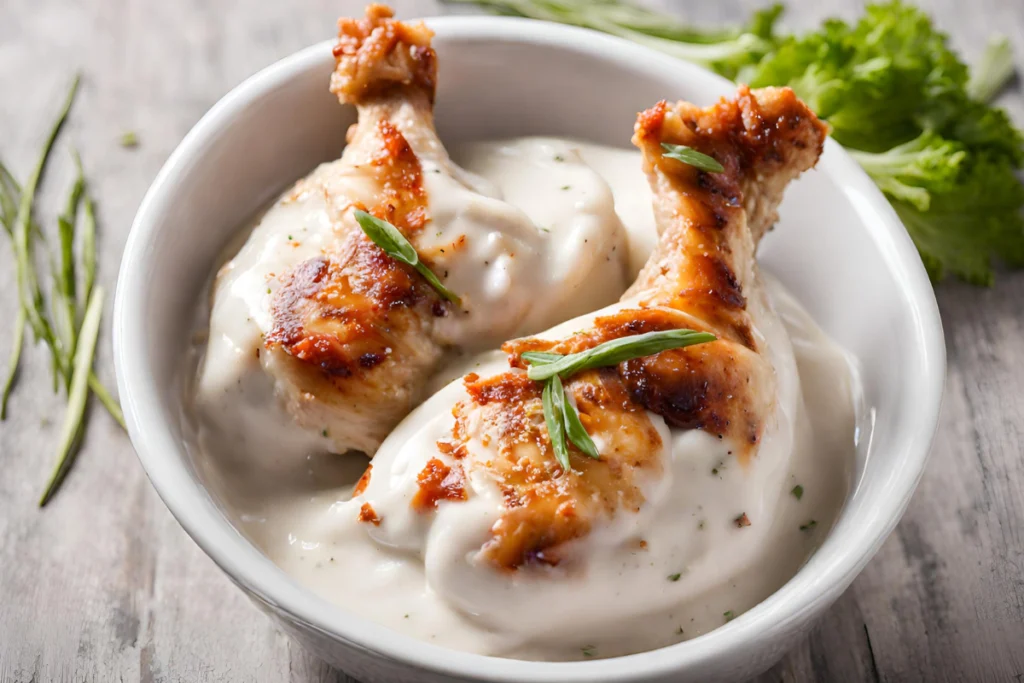
Introduction to Marinating Chicken with Yogurt
Why Choose Yogurt for Marinating Chicken?
At first blush, marinating chicken might seem as simple as dunking it in an acidic medium. However, the choice of marinade can profoundly affect both the flavor and texture of the chicken. Yogurt, particularly known for its creamy texture and tangy taste, brings something unique to the table.
Marinating chicken in yogurt isn’t just about soaking it in a flavorful concoction; it’s about harnessing the lactic acid and calcium in yogurt to gently break down the proteins in the meat. This process not only tenderizes the chicken but also helps it retain moisture during cooking, ensuring that the meat remains succulent and tender.
Unlike more acidic marinades, such as those containing lemon juice or vinegar, yogurt achieves a milder effect. This means you can marinate the chicken longer without the risk of it turning mushy—a common pitfall with highly acidic marinades. Thus, yogurt is not only effective but also forgiving, making it perfect for both novice cooks and seasoned chefs.
Scientific Insight into Yogurt’s Tenderizing Power
So, what exactly does yogurt do to chicken when marinating? The secret lies in the mild acids and enzymes present in yogurt. These components gently break down the muscle fibers without causing the proteins to denature too harshly, which is often the case with stronger acids.
Moreover, the calcium in yogurt activates enzymes that further tenderize the meat and enhance its ability to retain moisture. This results in chicken that is not only tender but also has a better texture and flavor after cooking.
Science and Benefits of Yogurt Marinades
Understanding the Tenderizing Effects of Yogurt
The science behind yogurt’s impact on chickens is fascinating. Lactic acid, a key component of yogurt, plays a pivotal role here. It’s gentler than the acids found in citrus fruits or vinegar, which means it tenderizes the chicken without the risk of overdoing it. Essentially, lactic acid works its way into the meat, subtly breaking down the proteins, which results in a tender texture that’s difficult to achieve with harsher marinades.
Moreover, yogurt contains calcium, which activates natural enzymes in the chicken that help to break down muscle fibers more effectively. This not only enhances tenderness but also ensures that the meat remains moist and juicy, even after cooking. Thus, yogurt not only improves the texture but also enhances the hydration of the chicken, making each bite succulently smooth.
Yogurt’s Mild Acidity: A Safer Choice for Longer Marination
One of the standout benefits of using yogurt as a marinade is its mild acidity. Unlike vinegar or citrus-based marinades that can turn chicken mushy if left too long, yogurt’s gentle acid profile allows for extended marination times without compromising the meat’s texture. You can safely marinate chicken in yogurt overnight or even longer, which deepens the flavor infusion without any negative effects.
Yogurt’s mild, creamy qualities make it especially attractive for meal prep or when you want flavors to fully develop in dishes planned in advance. If the sharp tang of vinegar or lemon in food often deters you, yogurt provides a subtler and creamier option that enhances flavors without dominating them.
Enhanced Flavor Retention and Moisture
The benefits of marinating chicken in yogurt extend beyond tenderness. Yogurt forms a protective layer around the meat, which helps to lock in natural juices and prevent them from escaping during cooking. This results in a significant retention of moisture, which is especially beneficial when grilling or roasting chicken, methods that often lead to drying out.
Additionally, yogurt’s creamy consistency helps to carry and meld spices and herbs into the chicken more effectively than thinner marinades can. This means that every bite is infused with the flavors of the marinade, creating a more harmonious and enjoyable eating experience.
Indeed, the practical benefits of using yogurt in marinades are supported by culinary experts who praise its ability to balance flavor with function. For an in-depth exploration into the mechanics of how marinades work, including yogurt’s role, you can consult resources like the Culinary Science of Marinades.
Preparing Yogurt Marinades
Essential Ingredients for a Flavorful Yogurt Marinade
Creating the perfect yogurt marinade involves more than just yogurt; it’s about blending the right ingredients to enhance the flavor and effectiveness of the marinade. Start with a base of plain, unsweetened yogurt—Greek yogurt is preferred for its thicker consistency, which helps the marinade cling to the chicken better.
To this, add a variety of spices and herbs. Garlic and lemon are classic additions that impart a bright, fresh flavor. For a deeper, earthier taste, consider incorporating ground cumin, smoked paprika, or turmeric. These spices not only add complexity to the flavor profile but also contribute to the overall tenderizing process due to their interaction with the yogurt’s lactic acid.
Balancing the Marinade: Proportions and Mixing Techniques
The key to a successful marinade is balance. For every half cup of yogurt, consider adding one tablespoon of lemon juice to thin it slightly and enhance its tenderizing power. The acidity of the lemon juice complements the lactic acid in the yogurt, making the marinade more effective at penetrating and tenderizing the meat.
Mixing is crucial; whisk the yogurt and its additives thoroughly to ensure a smooth, homogeneous mixture. This consistency is important for even coating of the chicken, ensuring that each piece is equally seasoned and exposed to the marinade’s tenderizing effects.
Customizing Your Marinade: Variations for Every Palate
The versatility of yogurt marinades is one of their greatest strengths. You can tailor your marinade to suit various culinary traditions and personal tastes. For a Mediterranean twist, add oregano and mint. For an Indian-inspired marinade, blend in garam masala and ginger. Each ingredient adds its own dimension of flavor that is enhanced by the creamy, tangy base of the yogurt.
It’s also possible to adjust the thickness and intensity of your marinade by experimenting with different types of yogurt. Greek yogurt offers a thicker, creamier texture, ideal for a hearty marinade that sticks well to the meat. Regular yogurt is lighter, which can be useful for a more subtle flavor infusion or when a more pourable marinade is desired.
By understanding the components of a successful yogurt marinade, you can begin to experiment with various ingredients that complement your culinary style. Remember, the goal is to enhance the natural flavors of the chicken, not overpower them, so start with small amounts of spices and adjust according to taste. This approach ensures that each dish retains a balance of flavors that are both harmonious and delightful.
Cooking with Yogurt-Marinated Chicken
Best Practices for Grilling, Baking, and Stovetop Cooking
Cooking yogurt-marinated chicken can yield exceptionally juicy and flavorful results, but the method you choose plays a pivotal role. Each cooking technique offers unique benefits that can enhance the marinated chicken’s texture and flavor.
Grilling: Grilling is ideal for achieving a slightly smoky flavor and a beautifully charred exterior. Preheat your grill to medium-high heat and lightly oil the grates to prevent sticking. Place the marinated chicken on the grill, and cook it until it’s evenly charred and reaches an internal temperature of 165°F, turning it once halfway through. The high direct heat will sear the exterior, locking in the juices and creating a delightful contrast to the tender interior.
Baking: Baking is a fuss-free method that is perfect for those looking for convenience and minimal monitoring. Preheat your oven to around 400°F, place the chicken on a lined baking sheet, and cook it until it’s thoroughly done and juicy. Baking allows for a more controlled cooking environment, which can be ideal for ensuring that the chicken cooks evenly without drying out.
Stovetop Cooking: For those who prefer a quicker method, cooking on the stovetop is effective. Heat a non-stick skillet or grill pan over medium heat and add a small amount of oil. Place the chicken in the pan, and let it cook undisturbed for a few minutes until it develops a golden crust before flipping it to cook through. This method is great for achieving a crispy exterior while maintaining a moist interior.
Marinating Times and Cooking Adjustments
While yogurt is forgiving in marinating times, it’s crucial to consider how long the chicken has been marinating to adjust cooking times appropriately. Chicken that has marinated for longer might require slightly less cooking time, as the marinade starts breaking down the proteins, tenderizing the meat more extensively.
Handling Tips: Safety with Leftover Marinade
When handling yogurt-marinated chicken, it’s important to remember food safety. Any leftover marinade that has been in contact with raw chicken should be discarded and not used as a sauce unless it is boiled thoroughly to eliminate any harmful bacteria. This ensures safe consumption and prevents cross-contamination.
Visual and Textural Cues for Properly Cooked Chicken
Ensuring your chicken is perfectly cooked involves paying attention to visual and textural cues. Look for clear juices as a sign of doneness, and use a meat thermometer to check that the internal temperature has reached 165°F. The texture should be tender and not rubbery, with a moist, slightly tangy crust from the yogurt.
Recipes and Serving Suggestions
Popular Recipes Using Yogurt-Marinated Chicken
Yogurt-marinated chicken is incredibly versatile, fitting seamlessly into various cuisines and meal plans. Here are some popular recipes that showcase the adaptability and flavor enhancement of yogurt as a marinade:
Mediterranean Yogurt-Marinated Chicken Kebabs These kebabs are perfect for a summer barbecue or a festive gathering. The marinade typically includes Greek yogurt mixed with lemon juice, garlic, and a blend of Mediterranean spices like oregano and thyme. Skewer the marinated chicken with onions, bell peppers, and tomatoes before grilling. Serve these flavorful kebabs over a bed of fluffy couscous or alongside a fresh Greek salad.
Indian Spiced Yogurt-Marinated Chicken For a dish with a bit more heat and complexity, try marinating your chicken in a mixture of yogurt, turmeric, cumin, and garam masala. This recipe is excellent for making chicken tikka, which can be cooked in a tandoor or on a grill. Serve with warm naan bread, steamed basmati rice, and a cooling cucumber raita to balance the spices.
Creamy Yogurt-Marinated Chicken Wraps
Ideal for a quick lunch or a casual dinner, these wraps use chicken marinated in yogurt, dill, and garlic. After cooking, slice the chicken and wrap it in a soft tortilla with lettuce, tomatoes, cucumbers, and a dollop of tzatziki. This dish is both refreshing and satisfying, making it a great option for a light meal.
Serving Suggestions and Presentation Tips
The presentation can significantly enhance the dining experience, especially when serving dishes as vibrant as yogurt-marinated chicken. Consider these tips for making your dishes not only taste delicious but also look appealing:
- Garnish Wisely: Fresh herbs like parsley, cilantro, or mint add a pop of color and freshness to the dish. A sprinkle of spices, such as paprika or sumac, can also add color and hint at the flavors within the dish.
- Side Dishes: Choose sides that complement the main dish without overpowering it. For Mediterranean dishes, opt for pita bread, hummus, or olives. For Indian recipes, pick sides like saffron rice or lentil dal.
- Plating Techniques: Serve the chicken over a smear of yogurt sauce or beside a heap of vibrant vegetables. Arrange the food neatly to highlight each component of the meal.
FAQs
What does marinating chicken in yogurt do?
Marinating chicken in yogurt is a culinary technique that offers several benefits, enhancing both the flavor and texture of the chicken:
- Tenderization: Yogurt contains lactic acid, which gently breaks down the proteins in chicken, making it more tender. This process is less harsh than using stronger acids like vinegar or citrus juice, which means the chicken remains tender without becoming mushy.
- Flavor Enhancement: Yogurt acts as a carrier for spices and herbs, which are absorbed into the meat during marination, enhancing the overall flavor. The mild taste of yogurt also complements a wide range of seasonings and ingredients.
- Moisture Retention: The fat content in yogurt helps keep the chicken moist during cooking, reducing the risk of drying out, especially when grilled or baked.
How long can raw chicken marinate in yogurt?
Raw chicken can safely marinate in yogurt for up to 24 hours in the refrigerator. Beyond this, there is a risk that the texture of the chicken could become too soft or mushy due to the continued activity of the acids and enzymes.
Do you rinse off yogurt marinade before cooking?
It is generally not necessary to rinse off yogurt marinade before cooking. Removing excess marinade by shaking off any large clumps or gently wiping the surface can help prevent burning during cooking, especially if grilling. The remaining marinade helps form a delicious crust and adds flavor as the chicken cooks.
How long to marinate meat with yogurt?
For meat, like chicken, marinating times can range from a minimum of 30 minutes to up to 24 hours, depending on the desired intensity of flavor and the type of meat. For tougher cuts of meat, longer marination times can be beneficial, while more delicate types like fish should be marinated for shorter periods to prevent the texture from breaking down.

